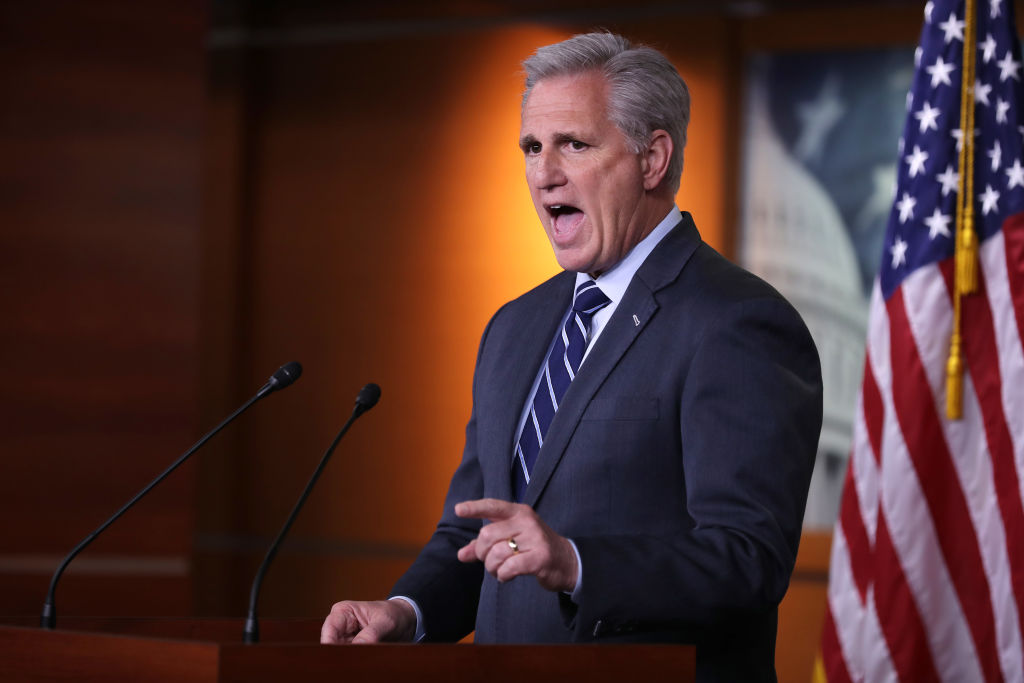House Republicans narrowly passed a debt limit increase late in the evening, Wednesday, April 26 – but it’s hardly the no-strings-attached deal their colleagues across the aisle demanded. President Joe Biden and congressional Democrats have said for months that they’re only willing to discuss spending cuts after a “clean” debt limit increase is passed. Speaker of the House Kevin McCarthy (R-CA) managed to squeak by a victory in the lower chamber, but without the support of the Senate and the White House, it holds little value outside the battle to control the narrative.
Debt Limit Clears House – Plenty of Strings Attached
The Limit, Save, Grow Act passed the House at 5:44 p.m. by a mostly party-line vote, 217-215. No Democrats voted for the bill, though two did abstain. Four Republicans opposed and one refrained from voting.
The bill that passed – a version heavily rewritten at the last moment – increases the debt limit by $1.5 trillion, and allows until March 31, 2024, for that to be reached before it has to be renegotiated. It also, however, caps federal funding to 2022 levels and aims to limit the annual growth to 1%. The Congressional Budget Office claims the bill would trim government deficits by $4.8 trillion over the next decade, but the cuts have Democrats in an uproar.
The 320-page tome of legislation would also stop the president from granting student loan forgiveness, repeal green energy tax credits, remove the additional funding for the IRS given by the Inflation Reduction Act, and give Congress more power to block executive branch regulations.
 Much Ado About Nothing?
Much Ado About Nothing?
The White House made it clear that, should this bill clear Congress, Biden would veto it rather than see it become law. Of course, there’s no real risk of that being necessary; the president’s statement was as much a matter of virtue signaling as the House passing the measure. “We’ve done our job,” McCarthy told reporters after the vote. “The Republicans have raised the debt limit. You have not. Neither has Schumer,” he added, presumably speaking to the president through the press.
“President Biden will never force middle class and working families to bear the burden of tax cuts for the wealthiest, as this bill does,” White House Press Secretary Karine Jean-Pierre said. “The president has made clear this bill has no chance of becoming law.”
Senate Majority Leader Chuck Schumer (D-NY) made his stance quite clear, as well, calling the bill an “extremist, right-wing agenda,” and the “definition of cruelty.” The Democrat doomsayer prophesied all manner of terrible things should this become law. From defunding law enforcement to cutting Pell Grants for college students and healthcare to worsening the opioid addiction pandemic – name something bad, and Schumer seems to believe the GOP’s debt limit bill will bring it about. “It’s DOA, plain and simple,” he concluded.

(Photo by Chip Somodevilla/Getty Images)
In previous debt limit arguments, Democrats oft asked Republicans to present their own budget proposal if they’re so keen on cutting spending. Well, they did. Democrats, however, didn’t seem to appreciate the effort. Another line from the left common to the discussions recently – and one to which they seem to be holding true even now – has been that they won’t even consider spending cuts until after the debt limit is increased with no strings attached.
The problem, of course, is that the GOP has taken that bait before. Every time it comes up, the borrowing cap is eventually raised. Though the promise to discuss spending cuts generally accompanies it, those future talks never come to fruition.
McCarthy knows as well as anyone else that his bill won’t survive the Senate or the White House – but he also knows that Democrats won’t take any budget cuts seriously unless they’re forced to. The question is whether passing this House bill gives Republicans enough of a boost in the narrative to push Democrats to come to the table and barter over the budget.
All opinions expressed are those of the author and do not necessarily represent those of Liberty Nation.
Do you have an opinion about this article? We’d love to hear it! If you send your comments to [email protected], we might even publish your edited remarks in our new feature, LN Readers Speak Out. Remember to include the title of the article along with your name, city, and state.
Please respect our republishing guidelines. Republication permission does not equal site endorsement. Click here

